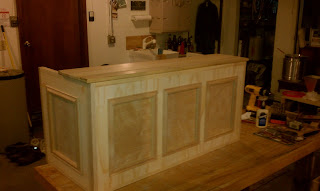My design is a 3-sided frame & panel cabinet with hinges between the panels to allow the cabinet to be quickly broken down for transport and storage. The front frame has 3 equally spaced panels and each side frame has a single panel. The front and side panels are connected with a piano hinge in each inside corner.
To save some money, I cut the rail and stile pieces from 5/8" plywood and used 1/4" oak plywood for the panel inserts. I used off the cap moulding to wrap the insides of the panels to add some detail and dress up the bar a bit. All of the assembled panels were wrapped in 1" white ash to hide the plywood edges. The top is also white ash which is segmented into 2 pieces to allow it also to be folded down to capture the sides. The folded top will have a hook and loop latch installed to keep the sides from opening up during transport.
Here's a few photos of the assembled bar without finish applied. I'm planning to apply a mahogany stain/polyurethane combination finish to give it an old tavern look. I'll post a few photos of the finished bar when it's done. Cheers!
Front of the Portable Bar
Back view of the bar with the jockey box installed
View of the folded bar ready for transport.



2 comments:
Beautiful work on the jockey box and collapse-able bar.
I'm considering building my own jockey box for my wedding next May. How does the 6 pass cold plate work? Is it able to chill warm beer?
Any tips for the beer carbonation if you serve the beer warm? Do you carbonate cold, then let the kegs warm? Do you overcarbonate any? How do you keep the foam down in the jockey box dispensing, i.e. did you use extra 1/4" tubing to match dispensing pressure.
Sorry for the man questions. My main question is definitely whether the cold plate works.
Happy brewing!
Hello there. Thanks for commenting! The cold plate works very well since it is a 2" thick block of aluminum with stainless tubing captured inside it. The kegs we were pouring out of weren't exactly warm but they weren't cold either. It will chill warm beer though so no worries there.
We did see some foaming until the lines were purged, but after that the beer poured nicely. I used 10' of 3/16" tubing inside the jockey box which helped control foaming as well. We applied about 10-12 psi to the kegs so by the time the beer exited the taps, pressure was only 1-2 psi.
I prefer chill plates to coils but they do cost more money. Keep an eye out on Craig's List for one. However, if you're only looking to pour 2-3 beers, coils may be the way to go for you.
I do carbonate my beers cold inside my kegerator. About a week at 12 psi gets them where i like them (~2.3 volumes of CO2.)
Cheers!
Post a Comment